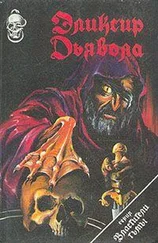The only windows gave on a court. Through their dirty panes already the grey light of that early Sunday morning glimmered, revealing the contents of the shadowy place, and the position of an iron ladder hooked to two rings under the scuttle overhead.
Ilse Dumont laid her finger on her lips, conjuring silence, then, clutching her silken skirts, she started up the iron ladder, reached the top, and, exerting all her strength, lifted the hinged scuttle leading to the leads outside.
Instantly somebody challenged her in a guttural voice. She stood there a few moments in whispered conversation, then, from outside, somebody lowered the scuttle cover; the girl locked it, descended the iron ladder backwards, and came swiftly across to where Neeland and Sengoun were standing, pistols lifted.
"They're guarding the roof," she whispered, "—two men. It is hopeless, that way."
"The proper way," said Sengoun calmly, "is for us to shoot our way out of this!"
The girl turned on him in a passion:
"Do you suppose I care what happens to you ?" she said. "If there were no one else to consider you might do as you pleased, for all it concerns me!"
Sengoun reddened:
"Be silent, you treacherous little cat!" he retorted. "Do you imagine your riffraff are going to hold me here when I'm ready to depart! Me! A free Cossack! Bah!"
"Don't talk that way, Sengoun," said Neeland sharply. "We owe these pistols to her."
"Oh," muttered Sengoun, shooting a menacing glance at her. "I didn't understand that." Then his scowl softened and a sudden laugh cleared his face.
"I'm sorry, mademoiselle," he said. "You're quite welcome to your low opinion of me. But if anyone should ask me, I'd say that I don't understand what is happening to us. And after a while I'll become angry and go downstairs for information."
"They know nothing about you in the salle de jeu ," she said, "but on the floor below they're waiting to kill you."
Neeland, astonished, asked her whether the American gamblers in the salon where Sengoun had been playing were ignorant of what was going on in the house.
"What Americans?" she demanded, incredulously. "Do you mean Weishelm?"
"Didn't you know there were Americans employed in the salle de jeu ?" asked Neeland, surprised.
"No. I have not been in this house for a year until I came tonight. This place is maintained by the Turkish Government—" She flashed a glance at Sengoun—" you're welcome to the information now," she added contemptuously. And then, to Neeland: "There was, I believe, some talk in New York about adding one or two Americans to the personnel, but I opposed it."
"They're here," said Neeland drily.
"Do you know who they are?"
"Yes. There's a man called Doc Curfoot―"
" Who!! "
And suddenly, for the first time, Neeland remembered that she had been the wife of one of the men below.
"Brandes and Stull are the others," he said mechanically.
The girl stared at him as though she did not comprehend, and she passed one hand slowly across her forehead and eyes.
"Eddie Brandes? Here? And Stull? Curfoot? Here in this house! "
"In the salon below."
"They can't be!" she protested in an odd, colourless voice. "They were bought soul and body by the British Secret Service!"
All three stood staring at one another; the girl flushed, clenched her hand, then let it fall by her side as though utterly overcome.
"All this espionage!" cried Sengoun, furiously. "—It makes me sick, I tell you! Where everybody betrays everybody is no place for a free Cossack!―"
The terrible expression on the girl's face checked him; she said, slowly:
"It is we others who have been betrayed, it seems. It is we who are trapped here. They've got us all—every one of us. Oh, my God!—every one of us—at last!"
She lifted her haggard face and stared at the increasing light which was turning the window panes a sickly yellow.
"With sunrise comes war," she said in a stunned voice, as though to convince herself. "We are caught here in this house. And Kestner and Weishelm and Breslau and I―" she trembled, framing her burning face in slim hands that were like ice. "Do you understand that Brandes and Curfoot, bought by England, have contracted to deliver us to a French court martial?"
The men looked at her in silence.
"Kestner and Breslau knew they had been bought. One of our own people witnessed that treachery. But we never dreamed that these traitors would venture into this house tonight. We should have come here ourselves instead of going to the Turkish Embassy. That was Mahmud Damat's meddling! His messenger insisted. God! What a mistake! What a deathly mistake for all of us!"
She leaned for a moment against one of the iron pillars which supported the attic roof, and covered her face with her hands.
After a moment, Neeland said:
"I don't understand why you can't leave this house if you are in danger. You say that there are men downstairs who are waiting to kill us—waiting only for Kestner and Breslau and Mahmud Damat to arrive."
She said faintly:
"I did not before understand Mahmud's delay. Now, I understand. He has been warned. Breslau and Kestner will not come. Otherwise, you now would be barricaded behind that breastwork of rubbish, fighting for your lives."
"But you say there are men on the stairs below who are ready to kill us if we try to leave the house."
"They, too, are trapped without knowing it. War will come with sunrise. This house has been under surveillance since yesterday afternoon. They have not closed in on us yet, because they are leaving the trap open in hopes of catching us all. They are waiting for Breslau and Kestner and Mahmud Damat…. But they'll never come, now…. They are out of the city by this time…. I know them. They are running for their lives at this hour…. And we—we lesser ones—caught here—trapped—reserved for a French court martial and a firing squad in a barrack square!"
She shuddered and pressed her hands over her temples.
Neeland said:
"I am going to stand by you. Captain Sengoun will do the same."
She shook her head:
"No use," she said with a shiver. "I am too well known. They have my dossier almost complete. My procès will be a brief one."
"Can't you get away by the roof? There are two of your men up there."
"They themselves are caught, and do not even know it. They too will face a squad of execution before the sun rises tomorrow. And they never dream of it up there―"
She made a hopeless gesture:
"What is the use! When I came here from the Turkish Embassy, hearing that you were here but believing the information false, I discovered you conversing with a Russian spy—overheard her warn you to leave this house.
"And there, all the while, unknown to me, in the salle de jeu were Curfoot and that unspeakable scoundrel Brandes! Why, the place was swarming with enemies—and I never dreamed it!…Yet—I might have feared some such thing—I might have feared that the man, Brandes, who had betrayed me once, would do it again if he ever had the chance…. And he's done it."
There was a long silence. Ilse stood staring at the melancholy greyish light on the window panes.
She said as though to herself:
"I shall never see another daybreak."…After a moment she turned and began to pace the attic, a strange, terrible figure of haggard youth in the shadowy light. "How horribly still it is at daybreak!" she breathed, halting before Neeland. "How deathly quiet―"
The dry crack of a pistol cut her short. Then, instantly, in the dim depths of the house, shot followed shot in bewildering succession, faster, faster, filling the place with a distracting tumult.
Читать дальше












